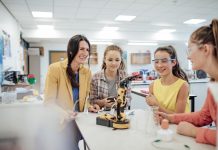A study from Temple University and the University of Pittsburgh deepens our understanding of memory processes and gives us insights into improving learning strategies in various fields
The study holds practical implications within an educational setting; traditional teaching methods often rely on repetitive and uniform study schedules, which overlooks the potential benefits of introducing variability in learning materials.
How can this change the way we learn?
Teachers can include this knowledge by diversifying educational content and encouraging students to engage with material in different contexts.
Doing this may enhance students’ ability to retain and apply information flexibly, fostering deeper comprehension and critical thinking skills.
The best way to retain information
The study also emphasises the benefits of spaced learning, highlighting the importance of adopting efficient study habits. Instead of cramming information into short periods, students can optimise their learning by spacing out study sessions over time.
This approach promotes long-term retention and reduces cognitive overload, allowing for more effective encoding and consolidation of information.
“We found that for associative memory, memory for the item and which scene it was paired with, benefited from stability.” Rottman said.
“For example, if you are trying to remember the new person’s name and something about them, like their favorite food, it is more helpful to repeat that same exact name-food pairing multiple times with spacing between each.”
Spaced learning in the workplace
This study’s outcomes can also help workplaces optimise employees’ skills. By incorporating spaced learning techniques and embracing variability in training programs, organisations can help employees acquire and retain new skills more efficiently.
This enhances adaptability and innovation within the workplace, driving organisational success in an increasingly dynamic environment.
By personalising interventions to meet the needs of diverse populations, such as individuals with learning disabilities or age-related cognitive decline, researchers can promote inclusive educational practices.
Using technology to personalise learning experiences
Advancements in technology offer exciting opportunities for personalised learning platforms and adaptive algorithms to deliver unique learning based on individual learning profiles.
Using artificial intelligence and machine learning, teachers and researchers can optimise instructional strategies and provide targeted support to learners, enhancing educational outcomes.
By recognising the connection between variability and spacing in memory formation, we can refine our approaches to education, training, and personal development, leading to more effective learning experiences.











